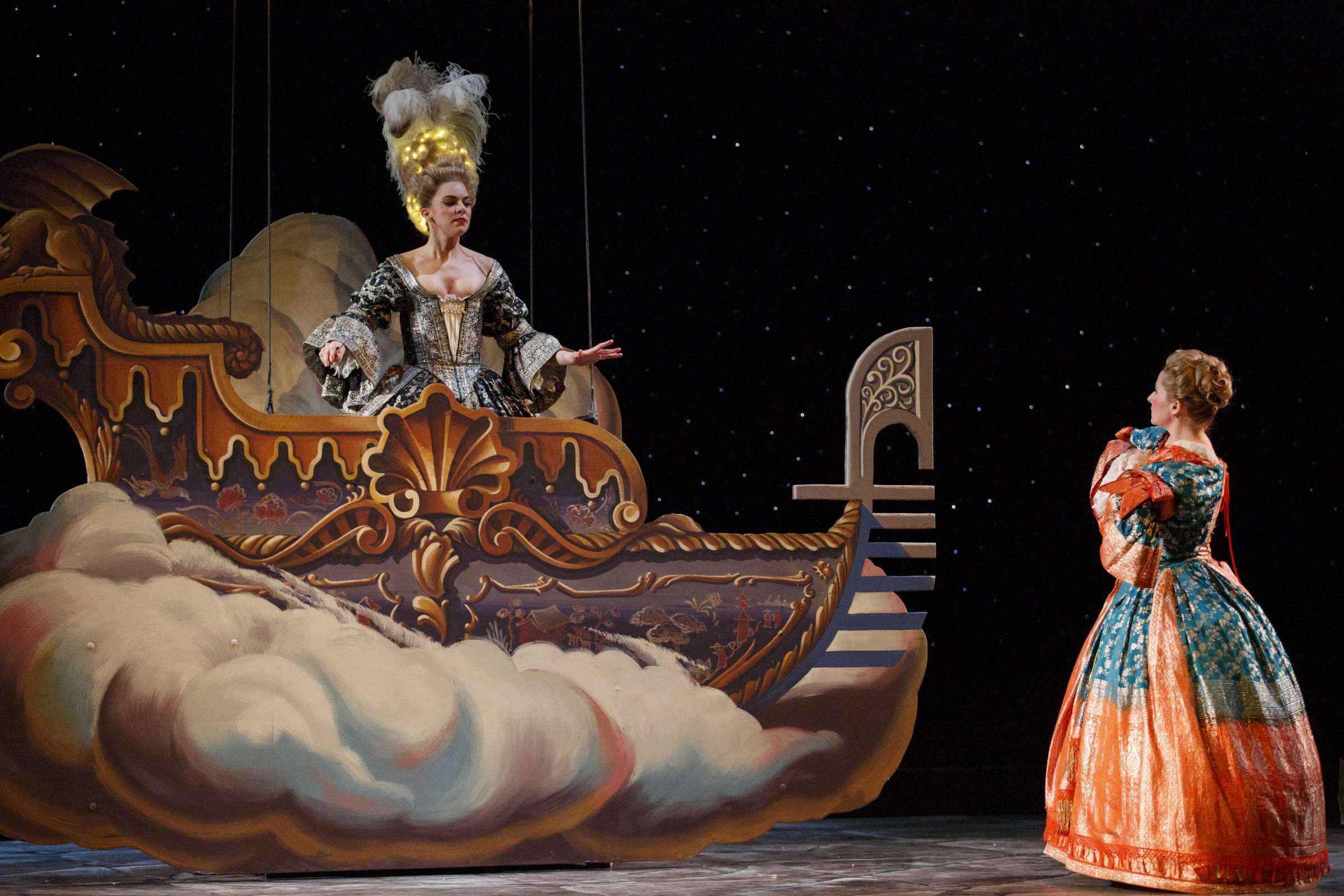|
Back
A welcome return Toronto
The Elgin Theatre
04/06/2013 - & April 7, 9, 10, 12, 13, 2013
Wolfgang Amadeus Mozart: Die Zauberflöte, K. 620
Olivier Laquerre (Papageno), Colin Ainsworth (Tamino), Laura Albino (Pamina), Ambur Braid (Queen of the Night), Joao Fernandes (Sarastro), Carla Huhtanen (First Lady, Papagena), Cassandra Warner (Second Lady), Laura Pudwell (Third Lady), Aaron Ferguson (Monostatos), Curtis Sullivan (Speaker, Second Armed Man), Cian Horrobin (First Armed Man), Grace Lee, Lucy Fitz Gibbon, Cynthia Smithers (Three Spirits), Artists of the Atelier Ballet
Opera Atelier Chorus, Tafelmusik Baroque Orchestra, David Fallis (Conductor)
Marshall Pynkoski (Director), Gerard Gauci (Set Designer), Jeannette Lajeunesse-Zingg (Choreographer), Bonnie Beecher (Lighting Designer)

A. Braid & L. Albino (© Bruce Zinger)
Opera Atelier has brought back its lively production of The Magic Flute (this time in the Andrew Porter translation) much to the delight of an opening night packed house.
The company originated the production in 1991 when it was the fist period production of the work given in North America. It was last seen here in 2006 (reviewed on this website) with many of the same performers: Olivier Laquerre (Papageno), Colin Ainsworth (Tamino), Carla Huhtanen (Papagena), and Laura Pudwell (Third Lady), all of whom are as good as before of not better. New to the cast (and to Opera Atelier) is Laura Albino, a marvellously fresh-voiced Pamina.
Making her role debut is Ambur Braid as Queen of the Night. She stops the show with her Act II aria when she is permitted by the staging to occupy the sweet spot at centre stage front. That sweet spot is important: the Elgin Theatre is rightfully a well-loved part of Toronto’s heritage, but its acoustics fall far short of ideal (what a contrast with Koerner Hall where Don Giovanni recently resounded so well). However, the Elgin permits stage machinery such as the flying machine that transports the three boys (termed the three spirits in this production) and the Queen.
The Porter translation delivers clear and singable English but at the same time it really brings forth the spiel part of singspiel, especially re the role of Papageno (no surprise when one recalls that the author of the libretto was the original Papageno, Emanuel Schikaneder). I wouldn’t have minded a few discreet cuts, especially in preference to the cut that was made, that of the scene in which Papageno and Papagena first meet when she presents herself as an old crone.
Gerard Gauci’s designs are as bright and delightful as ever, conjuring up a Persianesque fantasyland. The dragon deserves some sort of special award of its own (perhaps from the people behind the new International Opera Awards).
Joao Fernandes has a unique voice that has gained him roles in notable companies presenting early works. He comes across as rather woofy in this theatre; he has the low notes but not all that well projected. The stately music accompanying Sarastro and his court is given quite a brisk pace by David Fallis; any sense of procession we do get is thanks to dance and chorus movement with deft use of gilded palm fronds, one of the many felicitous design touches.
Ticket sales are brisk. Opera Atelier just might have another sellout on its hands.
Michael Johnson
|